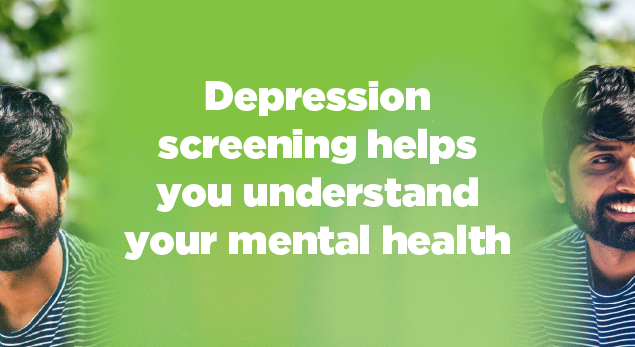Depression screening helps you understand your mental health
May 1, 2025

Depression can look different for everyone, and the symptoms of depression can be hard to recognize on your own. Although it’s a very common condition that affects about 8% of adults and 20% of adolescents in the United States, misunderstandings and stigma around depression make some people feel hesitant to talk about it.
Did you know that getting screened for depression is as easy as going to your yearly check-up and answering a few simple questions from your primary care provider? Including this quick and easy depression screening in your yearly visit helps us check in with your mental health regularly and catch symptoms of depression early, when they’re easier to treat.
When it comes to depression screening, there’s plenty of myths and misunderstandings: let’s talk about it!
Myth: I’m fine—I don’t need depression screening since I don’t feel depressed.
Fact: The symptoms of depression can look different for everyone. Cultural and personal differences can play a role in how depression shows up in different people. For example, some people’s symptoms are fatigue, muscle aches, irritability or anger, which are different than what we traditionally think of as depression. Letting depression go untreated can worsen your symptoms over time. Regular screening can help you identify problems early, even if you may not realize you’re facing depression.
Myth: Depression screenings are only necessary if you already have mental health concerns.
Fact: Depression can develop at any time, especially if you’re going through life changes, facing stress, or dealing with chronic illness. Getting screened for depression at your check-up each year helps you catch new symptoms early on, when they’re easier to treat.
Myth: If I screen positive for depression, it means I’ll be diagnosed with a mental illness.
Fact: A positive result from a depression screening doesn’t automatically mean you have depression, it just means you may be at risk. Screening is just the first step in understanding your mental health. If your screening shows signs of depression, your provider will help you understand your treatment options and follow your lead to get you the support you want.
Myth: If I get screened for depression, I’ll have to start medication.
Fact: If your screening shows you have symptoms of depression, your provider will explore your treatment options with you and follow your lead to take whatever steps you want to take. Your treatment options might include one-on-one or group therapy, psychiatry, medication, connections to substance use treatment or other medical or supportive services, or a combination of these.
Myth: Depression screenings are only necessary for people with severe symptoms.
Fact: Depression comes in different degrees of severity, and even mild symptoms can impact your day-to-day life. Getting screened regularly can help catch and treat depression early, before it becomes more severe or chronic.
Myth: Depression screenings are only for adults.
Fact: Depression can affect people of all ages, including children and adolescents. In fact, depression often starts in adolescence, making early screening particularly important for young people. At Evergreen, we start screening our pediatric care patients for depression at age 12.
Myth: Depression is just a part of life; it’s not worth getting screened for.
Fact: Depression is not a normal or inevitable part of life – it’s a treatable medical condition. When it’s left untreated, depression can significantly affect your quality of life, relationships, and overall well-being. You are worthy of getting the care and support you need to improve your symptoms. If you’re feeling nervous about getting a depression screening or want to learn more about our mental health services, give us a call at 716.847.2441 (press option 3) to talk to one of our friendly team members.
Still need to schedule your annual check-up for 2025? Visit your patient portal or call us at 716.847.2441 (option 5) to schedule today.